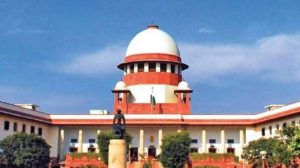
The Supreme Court on Tuesday declined to accede to a request by the Central government to defer the hearing in the challenge to the validity of Section 124A of the Indian Penal Code (IPC) which criminalises sedition [SG Vombatkere vs Union of India].
The Central government’s top law officers Attorney General R Venkataramani and Solicitor General Tushar Mehta made the request in view of the fact that the government is proposing to replace the Indian Penal Code with a new code, the Bharatiya Nyaya Sanhita.
A bench of Chief Justice of India (CJI) DY Chandrachud and Justices JB Pardiwala and Manoj Misra, however, turned down the request to defer the hearing.
“We decline the request of Attorney General and Solicitor General to defer the hearing the challenge to constitutional validity of 124A for more than one reason.. 124A continues to be in statute book and the new law in a penal statute will have only prospective effect and that validity of the prosecution remains till 124A remains and the challenge needs to be assessed thus,” the Court ordered.
The Court also said that the sedition law challenge would be heard either by a Constitution Bench comprising of five judges or seven judges.
The bench so constituted will be called upon to reconsider the correctness of the five-judge bench decision in Kedarnath Singh v. State of Bihar.
This 1962 judgment had upheld the validity of Section 124A.
“In our view, the appropriate course of action will be to place the papers before the CJI so that case can be heard by a Bench of at least five judges since Kedarnath Singh (judgment) was a Constitution bench judgment. We direct the registry to place the papers before CJI for directions,” the Supreme Court ordered today.
The CJI would take a final call on the administrative side to decide on the number of judges hearing the case.
The Court was hearing a batch of petitions challenging the validity of the existing sedition law.
The Central government had earlier submitted an affidavit that it has decided to re-examine and reconsider this provision, namely, Section 124A of the IPC.
The top court had, in May last year, requested the Central and State governments to refrain from registering any cases for the offence of sedition.
A bench of then CJI NV Ramana and Justices Surya Kant and Hima Kohli had directed that proceedings under Section 124A be kept in abeyance till the government’s exercise of reviewing Section 124A is complete.
When the matter came up for hearing today, Attorney General R Venkataramani suggested that the hearing may be deferred since new laws including one related to sedition have been proposed to takeover the earlier criminal laws contained in the IPC.
The new proposed laws are presently being examined by a parliamentary standing committee.
The request was opposed by petitioner’s counsel Senior Advocate Kapil Sibal who said that the newly proposed law on sedition is worse than the current provision.
“New law is much worse and the prosecutions will go on,” Sibal said.
Chief Justice Chandrachud noted that even if a new law comes in, it would only have effect on future cases. Hence, the question of whether Section 124A IPC is valid would still have to be decided since it would affect the pending cases.
“There is no way we can avoid judging the constitutionality of the Section 124 A because there is a new law since the new law will have prospective effect only.. Then there remains the case of existing prosecutions … Suppose the legislature brings even more stringent provision … then Parliament can also say that all past prosecutions under 124A will lapse and it will not happen.. Parliament can say that … unless that happens.. The challenge to 124A remains a live challenge,” the Chief Justice remarked.
The Court, therefore, turned down the request of the government.
The Court today also noted that when Section 124A IPC was earlier upheld in Kedarnath Singh’s case, it was not called upon to examine whether the sedition law would violate Article 14 of the Constitution.
It was only later that courts laid down that there is a link between the rights that are part of Articles 14 (right to equality), 19 (freedom of speech, expression etc.), and 21 (right to life and personal liberty).
Therefore, this aspect would also now have to be considered by the Constitution bench deciding on the correctness of the Kedarnath ruling, particularly since the petitioners have asserted that Section 124A, IPC violates all three Articles.
Another ground of challenge mounted by the petitioners is that Section 124A does not distinguish between “State” and “government.” As per the petitioners, “State” cannot always be equated with “government.”